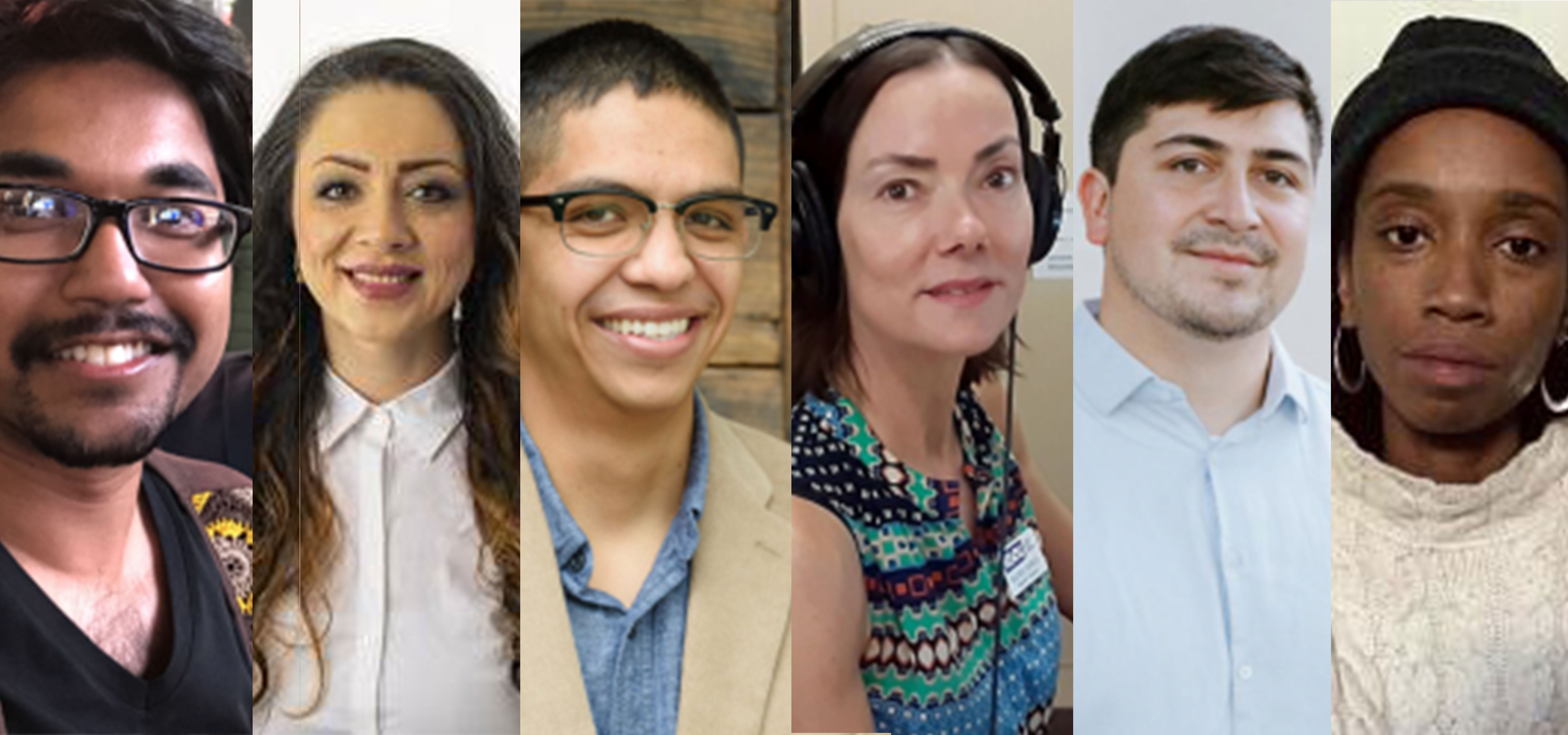
Cross-Disciplinary Career Success:
Post-MFA and Postdoctoral Fellow Profiles
Over the last five years, the Global Arts and Humanities Discovery Theme has supported 17 post-MFA and post-doctoral fellows in the College of Arts and Sciences. These positions foster cross-disciplinary exchange and professional development with the goal of facilitating fellows entry into tenure-track positions in the academic marketplace and the public arts and humanities. In this brief profile, we highlight several of our fellows as they continue to carry out innovative cross-disciplinary, community-engaged work for both academic and public audiences.
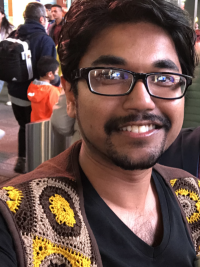
RASEL AHMED
Assistant Professor of Theatre, Film and Media Arts (Ohio State)
Ahmed is a community-based filmmaker who uses participatory documentation, archival research and collaborative reenactment to create films that combine documentary with fantasy. Ahmed’s areas of expertise include gender and sexuality as well as migration studies and political organizing, all themes combined in his recent projects, such as the hybrid film, Who Killed Taniya? ,in which Ahmed combines autobiography and fiction to interrogate his own complex history and identity as a stateless person forced to leave his native Bangladesh. Ahmed sees filmmaking as a methodology for unpacking social relationships and exploring community, and he is currently working on projects around taste memory and culinary citizenship and the effects of technology-mediated family communication.
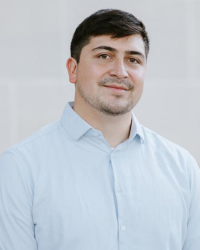
MICHAEL CHARLES
Provost's New Faculty Fellow and Assistant Professor of Biological and Environmental Engineering (Cornell University)
After completing his postdoctoral project, which focused on Ohio’s Hopewell Ceremonial Earthworks (now a UNESCO World Heritage Site) in Newark, Charles was named the Provost’s New Faculty Fellow and Assistant Professor of Biological and Environmental Engineering at Cornell University. He also holds positions as affiliate faculty of Cornell’s American Indian and Indigenous Studies Program and is a faculty fellow of the Cornell Atkinson Center for Sustainability. As a Diné (Navajo) scholar, Charles’ goals are to bring together computational sustainability frameworks to communities — particularly Indigenous Nations — focusing on exploring the interface of multiple knowledge systems to transform practices and policies. The Charles Lab’s recent projects include developing nature-based frameworks focused on climate mitigation and public health and looking at the effects of Land Grant University endowments on Indigenous food systems. Charles also works with the International Indigenous People’s Forum on Climate Change to advocate for Indigenous rights, leadership and self-determination in UN climate negotiations.
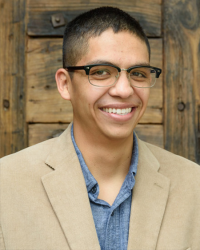
GREGORIO GONZALES
Tribal Liaison (New Mexico Department of Cultural Affairs)
After a year as a postdoctoral researcher in the Department of Comparative Studies where he focused on critical Indigenous studies, Gonzales — who identifies as Comanche and Genízaro from the Native New Mexico borderlands — is now doing the work of tribal cultural empowerment with the New Mexico Department of Cultural Affairs as a full-time tribal liaison. Working collaboratively with a broad range of groups representing Mexico’s 23 tribal nations — including federally recognized tribal governments, state agency divisions and urban Indigenous community organizations — Gonzales’ goal is to provide tangible contributions to the quality of life and economic well-being of tribal communities. His position sees him traversing the state to establish strong relationships with Indigenous communities, attending cultural events and helping to develop culturally responsive programming in order to ensure that the contributions of Native nations remain a vital and visible part of New Mexico’s story.
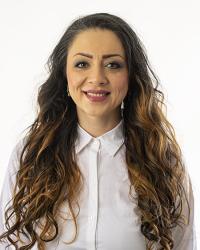
SONA HILL KAZEMI
Assistant Professor of Race, Gender and Sexuality Studies (University of Wisconsin-Lacross)
Kazemi’s post-fellowship career has seen her engage with and expand multiple projects that lie at the intersection of disability studies, storytelling and global human rights. She is currently an assistant professor in the Department of Race, Gender and Sexuality Studies at the University of Wisconsin-Lacrosse, where she recently taught the department’s groundbreaking first undergraduate disability studies course. Her monograph, Disabling Relations: Injured Bodyminds and Active Witnessing, is due out this year from Temple University Press. The book contributes to the growing field of transnational disability studies through its focus on five case studies narrating the stories of those disabled by violence, torture, punitive limb amputation and acid attacks in Iran. Kazemi is currently working on a second book-length project, tentatively titled Interdependence, Feminism, and Infrastructure of Care in Prison, as well as co-editing two collections focused on global disability studies.
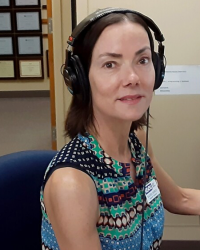
RACHEL HOPKIN
Senior Producer (KGOU Public Radio—Norman, Oklahoma)
Since her time as a postdoctoral fellow/researcher at Ohio State’s Center for Folklore Studies, Hopkin has continued to create and produce innovative cross-disciplinary content focused on the power of sound. Trained as a radio producer, ethnographer and folklorist, Hopkin has now traded Ohio for Oklahoma, where she is a senior producer at KGOU public radio in Norman. Working in radio, Hopkin continues to follow her passion for capturing and creating compelling, sound-rich stories focused on rich local traditions. Along with initiating and overseeing special projects at the station, she also hosts and produces a popular weekly podcast entitled “How Curious,” which invites the public to explore Oklahoma legends, tall tales, oddities and conundrums. Recent episodes range in focus from the depiction of Midwest City, Oklahoma as “America’s Model City” in the 1950s to the origins of the chicken dance.
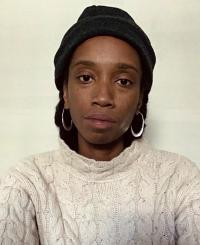
DIONNE LEE
Assistant Professor of Art (Ohio State )
Lee works in photography, collage, sculpture and video to explore power, survival and personal history in relation to the American landscape. Her 2019 piece, "Challenger Deep" — currently featured in the 2024 Whitney Biennale — concentrates on the artist’s hands as she moves through an empty landscape, searching the site with dowsing rods, suggesting that our current environmental crises mandate increasingly creative or even magical solutions. An upcoming photo/video exhibition, "Currents," at Cushion Works San Fransisco, uses photographs and video to further this theme of landscape interventions, tracking the relationship between the recording and interpretation of place through a focus on the flow of water and transmission of energy between transmitter and receiver, place and body.
